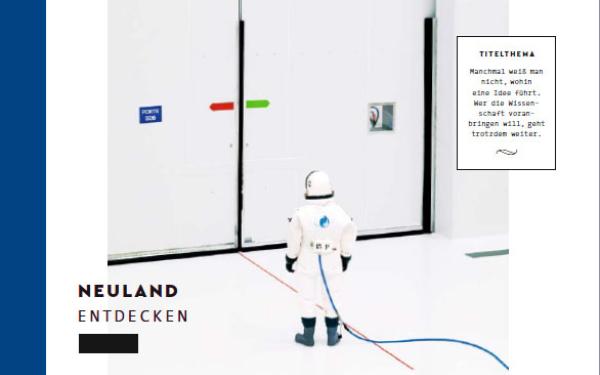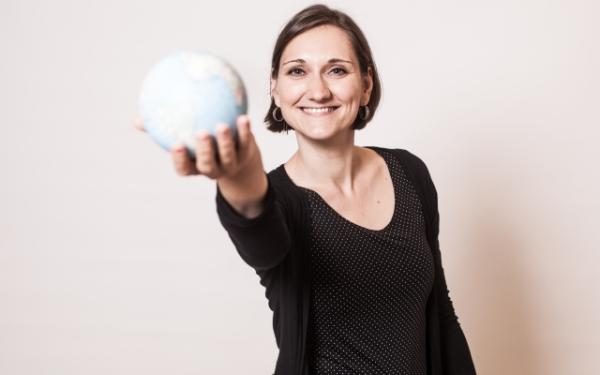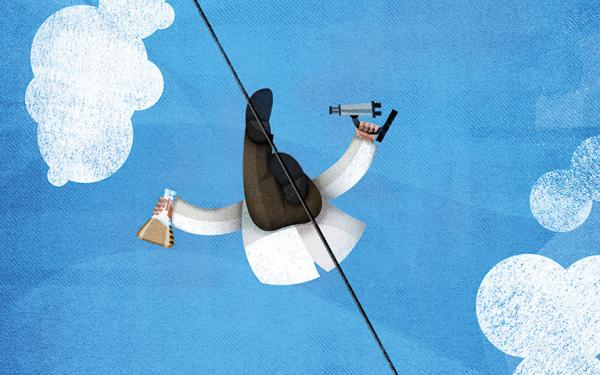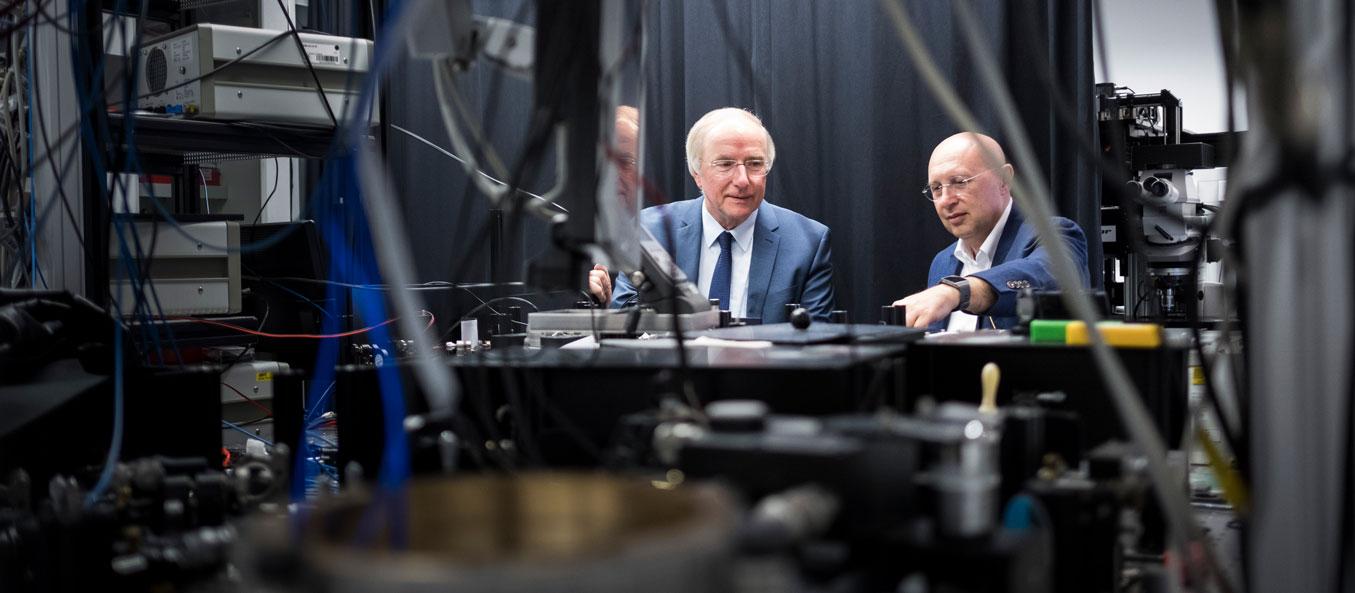
Daniel Pilar
"I Always Advise Going for a Knockout Victory."
The Nobel Laureate Stefan Hell and the Secretary General of the Volkswagen Foundation Wilhelm Krull on the sirens of assembly-line research, fainthearted experts and courageous free spirits.
Stefan Hell believes in plain-speaking. He agrees with Wilhelm Krull that there is a growing pressure in science to conform, and many researchers are succumbing to it. Journalist Christine Prussky moderated an exchange of ideas between the Nobel Laureate and the Secretary General of the Volkswagen Foundation and condensed their conversation.
Mr. Hell, some time ago the magazine "ZurQuelle" began honoring academic failure. At the award ceremony, schnapps was handed round. Do you maybe also need a stiff drink when you hear that?
Hell: (laughing): No. Nor do the winners need one, but rather such a form of recognition that lasts longer than alcohol. If you conduct risk-prone research, there must be a possibility to fail honorably. Although honorable failure cannot be measured as easily as success, it is not out of the question and should be suitably rewarded.
Mr. Krull, do researchers first have to learn to fail in order to win?
Krull: Failure is part of science. If there were no possibility of failure in our funding initiatives such as the "Freigeist Fellowships" or "Experiment!", it would be wrong to say we are stimulating risk-laden research. Conversely, we find that at least two thirds of all the outline proposals submitted in the context of programs intended to support ground-breaking research are just "normal science".
Hell: That doesn’t surprise me at all. The fact that researchers are rarely prepared to take risks is a consequence of the expansion of science. I'm wary of the word "industry", but there are so many researchers engaged in ever larger projects that routine inevitably creeps in. Few of them break out of the box to attempt something completely new.
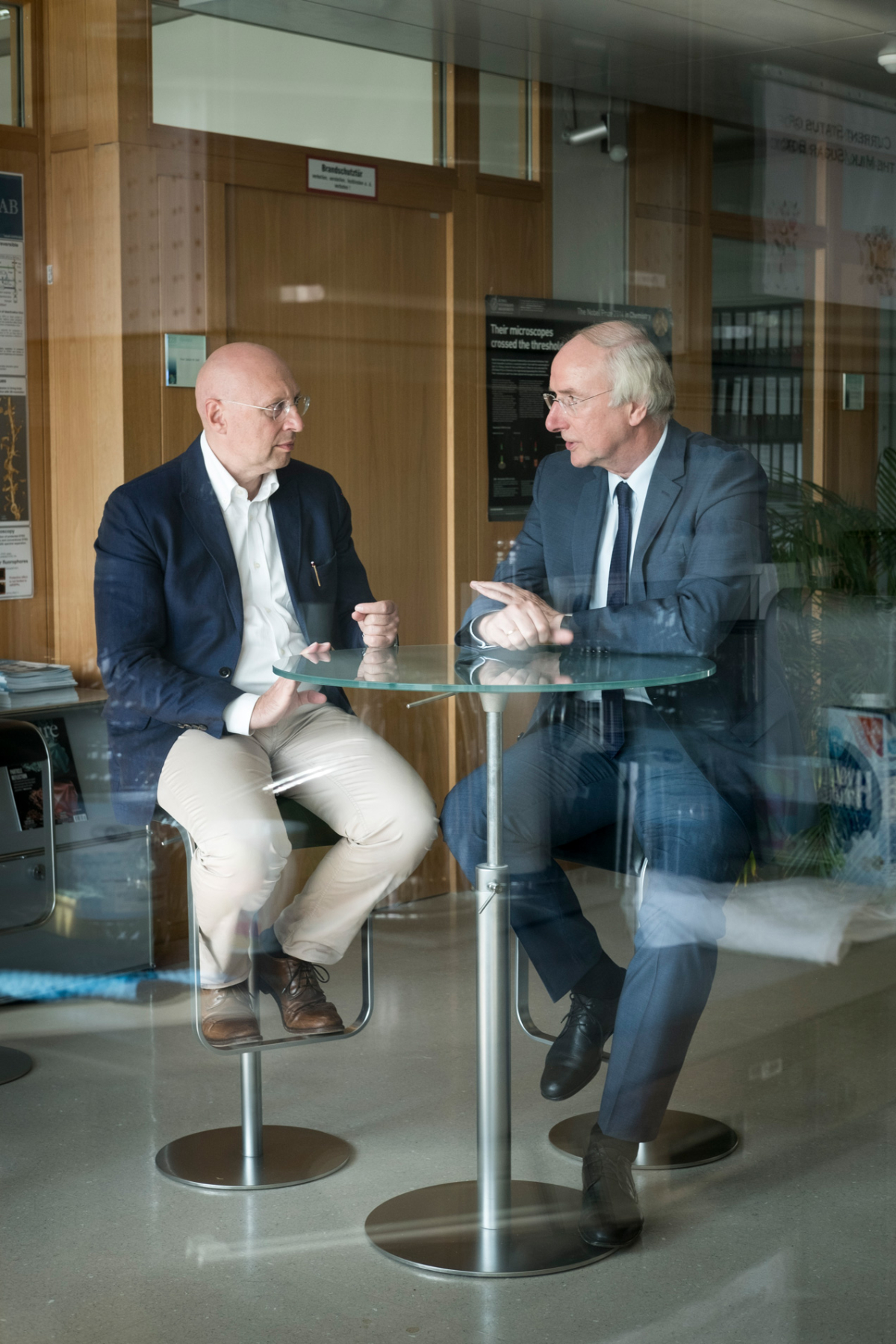
Stefan Hell (left) and Wilhelm Krull in discussion
Germany ranks third in the Nobel Prize ranking – after the USA and the UK. That’s still quite remarkable, isn’t it?
Hell: You can’t grasp the current situation on the basis of statistics covering almost 120 years. Although, looking back, there is a correlation between economic performance and dominance in research. This correlation should not be underestimated in the future either.
Krull: The Excellence Initiative shows that this has been recognized. However, it supports large collectives, a great part of which are mainstream in research.
That’s not the way to generate radical innovation.
Hell: This can be put down to the application process. If I have a good fundamentally new idea, I don't spend months writing an application for other people to judge whether the idea is good or not. For what reason should they evaluate fairly and correctly? Maybe they would like to have had the idea themselves. I have never made good experiences with original proposals. Therefore, I try to realize really good ideas with our own means. This is possible in the Max Planck Society. When I do write proposals, which is seldom the case, I usually apply for the expectable. And then reallocate the funds ...
Krull: Young researchers, though, often have no other choice. The brief period of just two to three years of funding further increases the pressure to conform. Research is therefore channeled in the direction of what appears to be virtually certain in the mainstream of knowledge. That’s not the way to generate radical innovation.
Well then, let’s scrap grant-funded research altogether!
Krull: No, no.
Hell: Not so radical. For goodness’ sake, we also need the mainstream! Science needs the conservative element, too. In this respect, the application system is okay; but it must not be allowed to dominate over everything else.
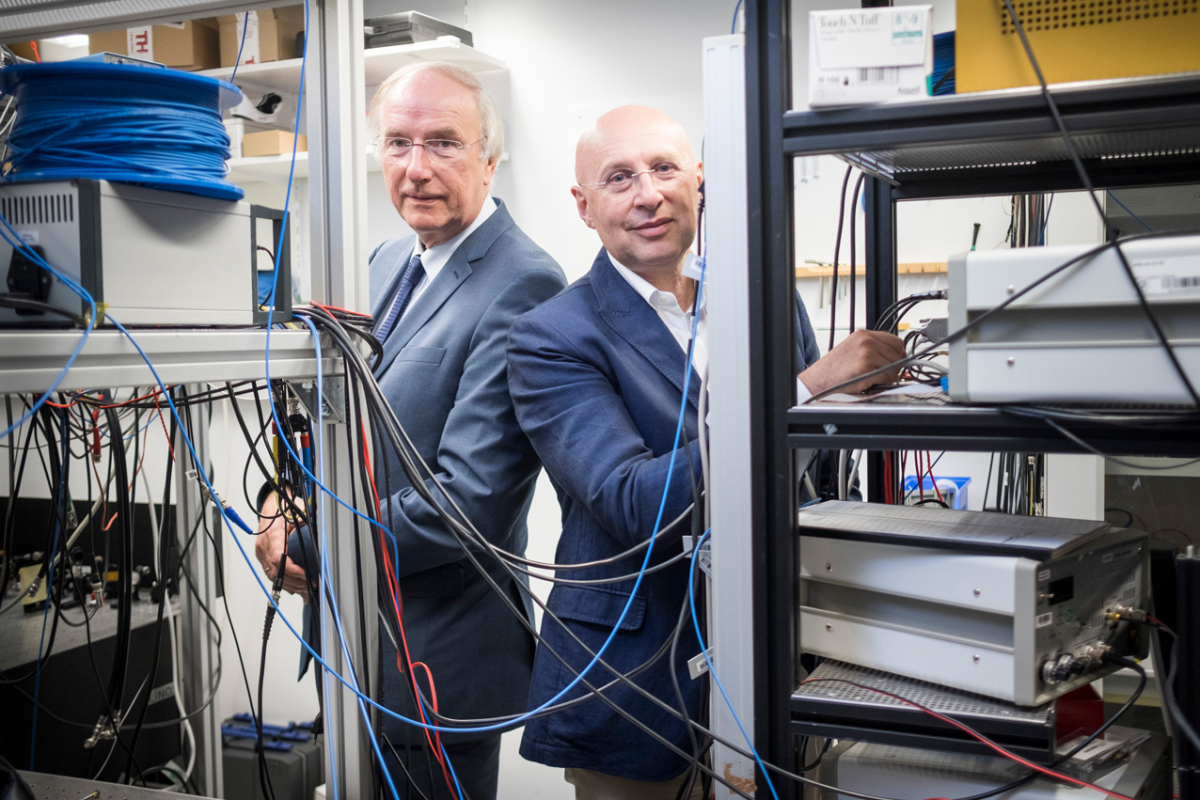
Stefan Hell (right) and Wilhelm Krull
Krull: This is the challenge we willingly face up to. As a foundation, we are able to act differently from public sponsors of research and take more risks. We also work with external reviewers, whom we prepare on the eve of meetings to be receptive to original ideas. They are not supposed to assess proposals to death. Counting the legs on flies does not capture the creative potential of a research personality.
How do you recognize a creative research personality?
Krull: Such a person must not only be accomplished but also curious and courageous – and persistent in their research. It then depends on seizing that flash of inspiration.
What can public funding contribute?
Krull: It has to get away from the short application cycles of two to three years, during which the application machinery runs virtually non-stop. That’s absurd.
Krull: It has to get away from the short application cycles of two to three years, during which the application machinery runs virtually non-stop. That’s absurd.
Hell: ... and promotes assembly-line research, whereas we need structures facilitating handwork. It depends on the individual person. I’m a case in point. I had an idea of how to overcome the resolution limit of optical microscopes and followed it through to its ultimate realization. I try to support likeminded scientists who passionately believe in their ideas – and show a hint of ignorance.
Come again?
Hell: Yes, ignorance can be very helpful for achieving breakthroughs. Take Columbus, for example. He massively underestimated the diameter of the earth. If he had known how big it really was and how long his western route to India would really take, he probably would never have set out on his famous voyage. It was a little bit like that in my case. I didn’t involve the experts until after I had published my idea. Everyone advised against it because, unlike me, they knew what could go wrong. To be honest, if I had asked them beforehand, I might not have dared to publish it in the first place. But by then the idea was public, and I decided to go through with it. A little ignorance lowers the risk threshold. If you are fully aware of the dangers, you start to waver. That’s the whole problem with experts and consultants. They think they know what will work and what won't – after all, that’s what they are there for. So everything goes round in circles and there is no breakthrough.
Krull: This makes it all the more important for us in the Foundation to engage open-minded experts who have the courage to trust in freethinkers.
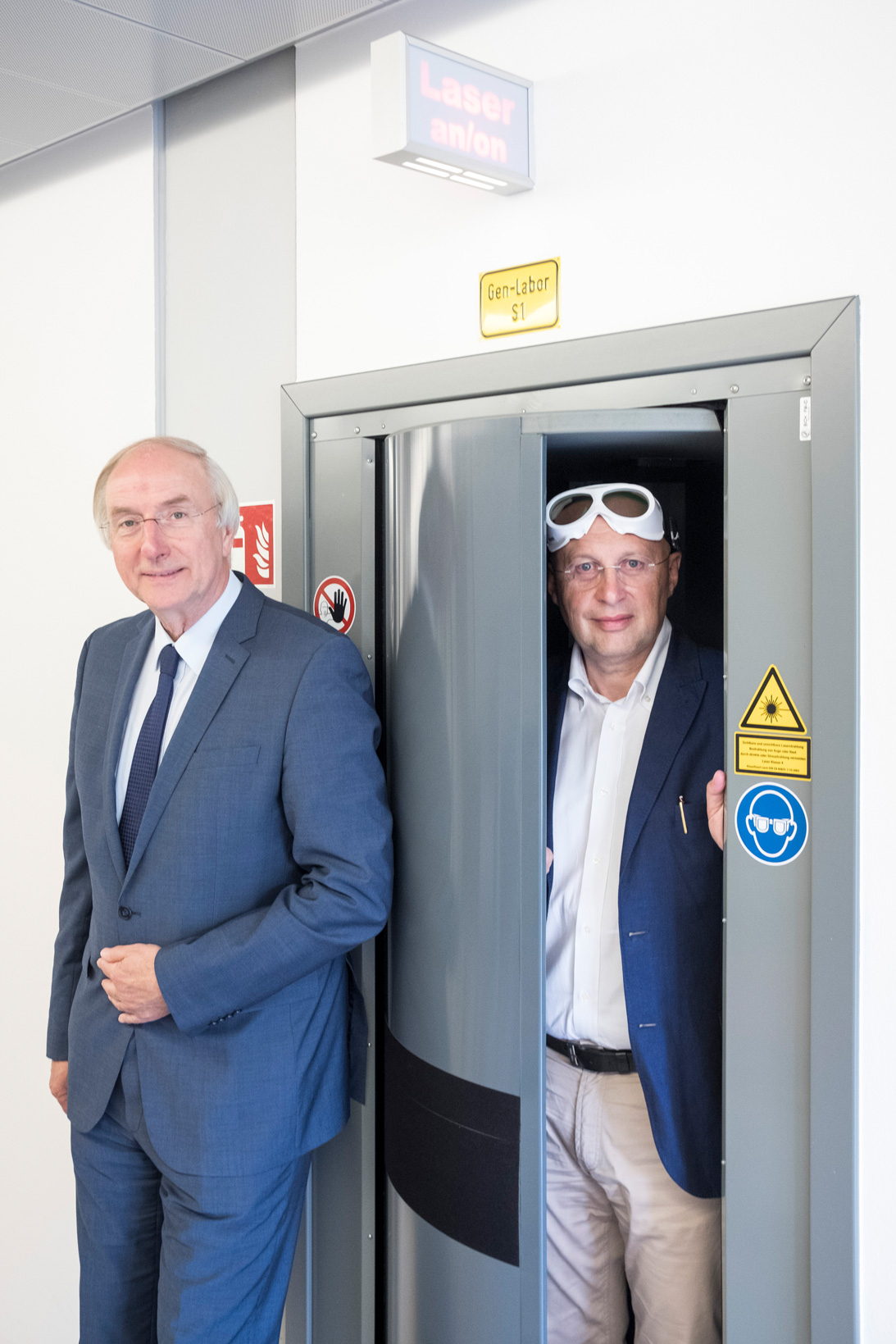
Opening the door to new research territory: Stefan Hell (right) shows Wilhelm Krull an optics room at the Max Planck Institute for Biophysical Chemistry in Göttingen, where his team is working on prototypes for new nanoscopy processes.
Hell: By the way, I like the title of your funding initiative very much. "Freigeist" – if the program had existed in my early days, I would have applied. It's a wonderful opportunity for people with an adventurous spirit who are driven by an idea – and not simply by the desire to become a professor. Those who aspire to be appointed to a professorship learn how to get proposals through the DFG, how to publish "well", how to behave appropriately in committees and so on ... This kills creativity. I can't generate much respect for an approach like that – which is not to say that I condemn my colleagues for it. Rather, my criticism is directed at a funding system that leads researchers to act in such a manner.
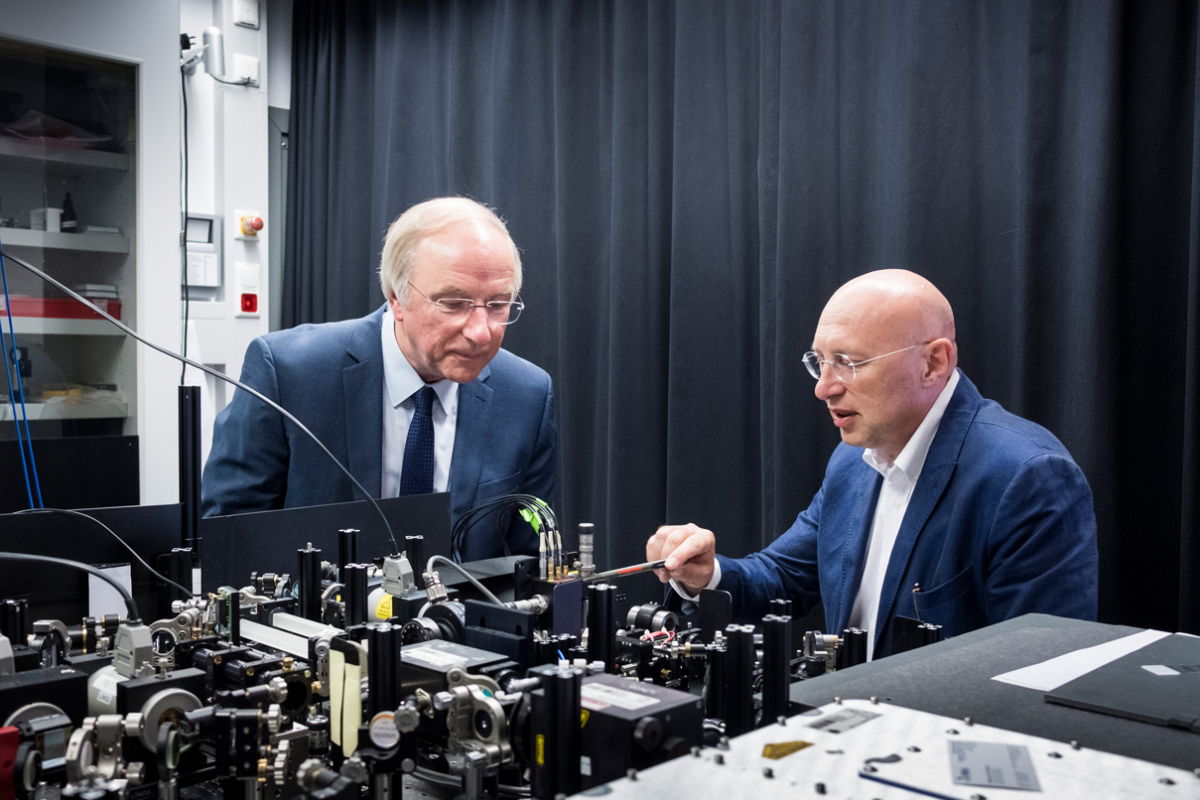
Stefan Hell (right) and Wilhelm Krull in the optics room at the Max Planck Institute for Biophysical Chemistry in Göttingen
You are setting up a department at the Max Planck Institute for Medical Research in Heidelberg. What are you paying particular attention to?
Hell: I want to run a small team and I am looking for people who are interested in real breakthroughs. They should discover something that is later linked to their name. I always advise young researchers to go for a knockout, not just a victory on points.
Krull: Nonetheless, a considerable number of professors today advise young people to choose the safer path. I remember cases where university professors advised against taking up a Freigeist Fellowship in favor of a safe project. If such conformity mechanisms spread, we won't get very far.
Hell: That's because professors often see themselves as career advisors. From this perspective, it may well be better to choose the quickest path leading to a professorship. My hope is that more young researchers will think about research as such – and not merely about their careers. But this is only possible if failure can also be seen to be honorable and is not treated as a disaster.
Are you able to quantify such a notion?
Hell: It would be good if five to ten percent were to concentrate on original research. What's interesting, by the way, is that in my experience women find it a little more difficult to take risks. I can understand that. Nevertheless, it doesn't help to mitigate the frustration I get when after doing my utmost to promote talented women, making them maximum concessions in the allocation of funds, they still end up choosing safety and the next step on the career ladder. That makes me think.
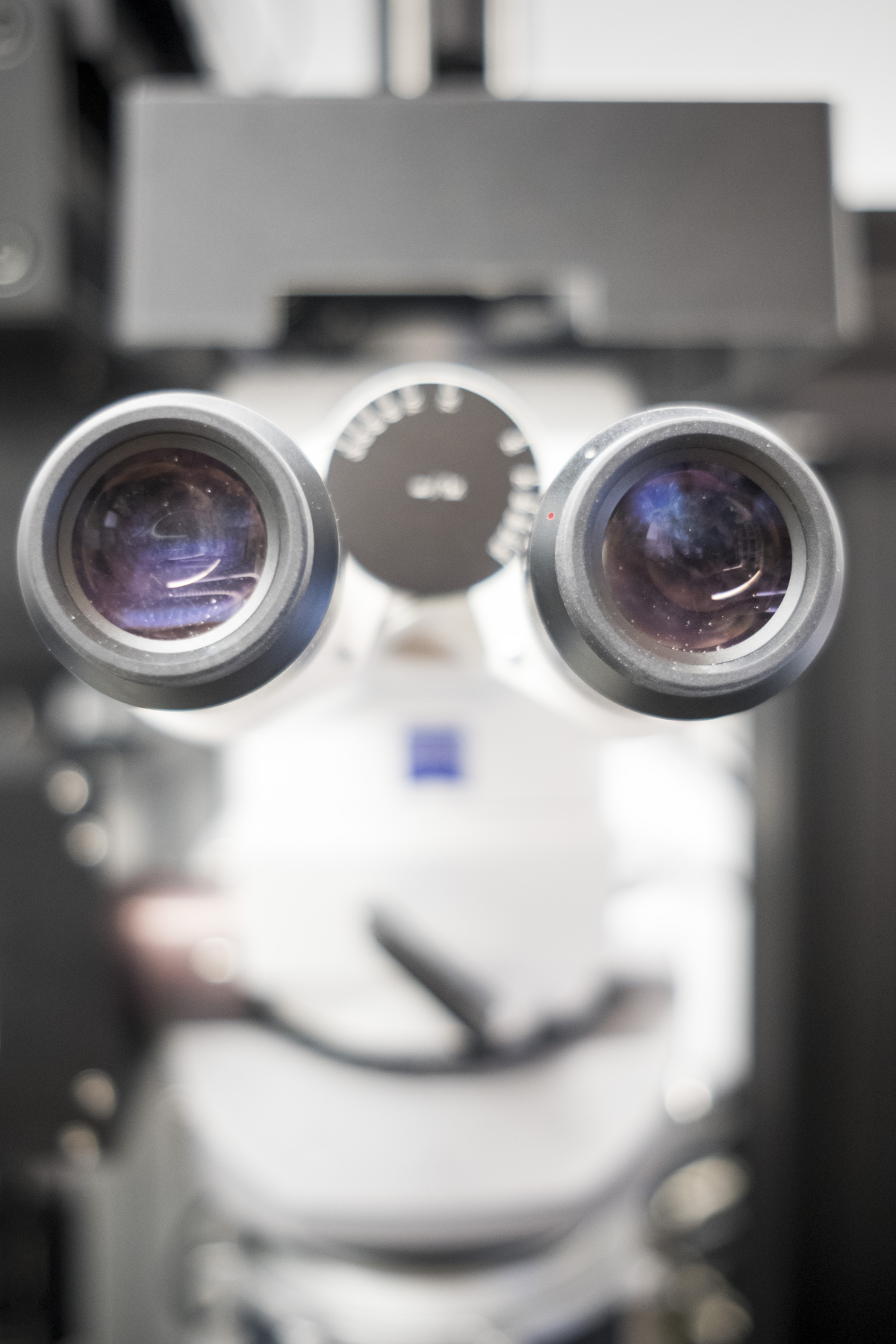
The science researcher Helga Nowotny advises to embrace risk. How can science do this?
Krull: Such a cultural change is only possible in concert with all groups of actors. Early career researchers, professors, university leaders, the heads of science and funding organizations – all are challenged to outwardly promote the signum of a creativity culture and to internalize it themselves.
Hell: Science is part of society, but it must not submit to the zeitgeist. It must respond with the free spirit. To cite my modest example once again: The resolution limit discovered by Ernst Abbe was regarded as given in the 20th century. I queried this, experienced resistance, and was secretly subjected to slander. However, a good science funding organization supports people who, for good reasons, do not let themselves be taken in by the zeitgeist and the prevailing expert opinion.

